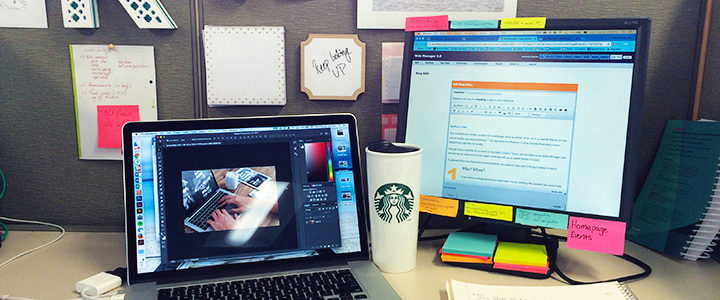If You’re Reading This, You’re A Publisher

The moment you create content for a webpage, send an email, show up in a search engine, or use social media–you are a publisher. You become an influence in what people think about your department and the university.
Though only a handful of us work on the Web Content Team, we consider every WordPress user we train as an extension of our team, working with us to create better content.
To demand the best from your content before you publish, here are 5 things to keep in mind:
Who? When?
If you knew nothing about your own topic, would reading the content you write help you, or leave you confused?
Few things are worse than being left with more questions than answers. When writing, be sure to leave your reader feeling they have the answers.

- Who is this for?
- What is it?
- Where is it?
- When will it happen?
- Why is this important?
This gives readers the confidence to make a decision. Try having someone with fresh eyes read your copy and write down any question that’s nagging at them.

Action!
Put the verb at the beginning of important and action-based sentences.
Here’s an example from the recently-created Strategic and Personal Communication home page:
Learn how to study the marketplace and relate to audiences, craft and deliver effective messages that will ignite action with your target markets, and create relationships with people and companies with a B.S. in Communication.

TL;DR
TL;DR is a popular web acronym meaning Too Long; Didn’t Read.
Is all of your content necessary, or can it be cut down? Full descriptions, extra text, and lengthy titles are all too common in academic web content. Web users are searching for information. They do not want to do a text search to find a simple answer.
Limit your bolded words and NEVER USE ALL CAPS because it comes across as aggressive.
In order to make your most important information stand out, slim the rest of your information down.
Make your text easily digestible. Split up paragraphs so they are easier to scan, use headers, and use bullets. Include important information, descriptions, or photographs to draw the reader’s eye. Long text without any breaks is often skipped over by web users.

Jargon
Academic content is often guilty of using jargon. Jargon is speech or writing full of long, unfamiliar, or roundabout words or phrases.
Readers are new to this content. High school juniors and seniors, for example, are left trying to understand terms that they would only learn after they were enrolled at LU. Keep your content clear of jargon.

Ownership
You are responsible for maintaining your content. If you include calendar dates, be prepared to remove an event as soon as it has passed. Few things are more off-putting to users than outdated information. Readers will wonder why they bother to check the content at all when it is clear that the publisher never does.
 If you include an external link, you are responsible for ensuring the content it links to is relevant and useful. When pages contain many links, it also requires constant upkeep. Each link must be checked to ensure that it sends the reader to useful information.
If you include an external link, you are responsible for ensuring the content it links to is relevant and useful. When pages contain many links, it also requires constant upkeep. Each link must be checked to ensure that it sends the reader to useful information.
Meet the Author

Rhea Crider
Web Content Associate
External Communications
References
1Halvorson, K. (2010). Content strategy for the web. New Riders Publishing.
Wormley, R. (2016). 12 best practices for writing website copy that actually converts. Startup Marketing Blog. Available at http://www.100daysofgrowth.com/blog/how-to-write-website-copy-that-converts/


